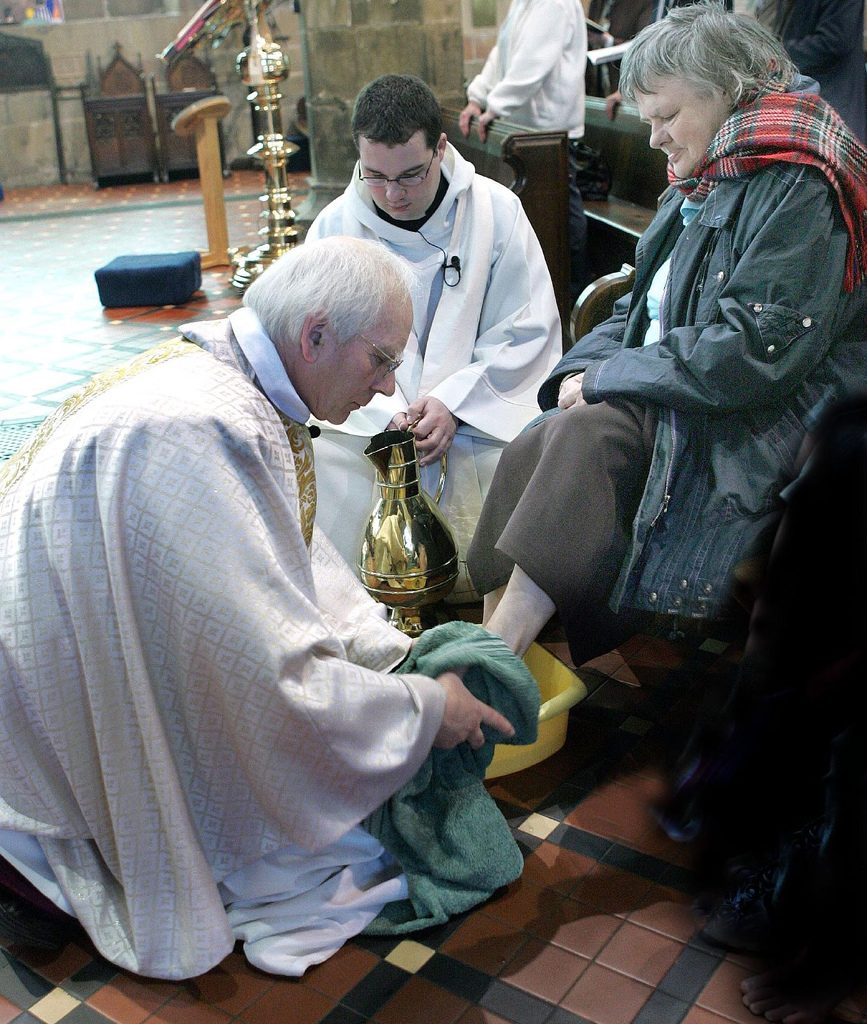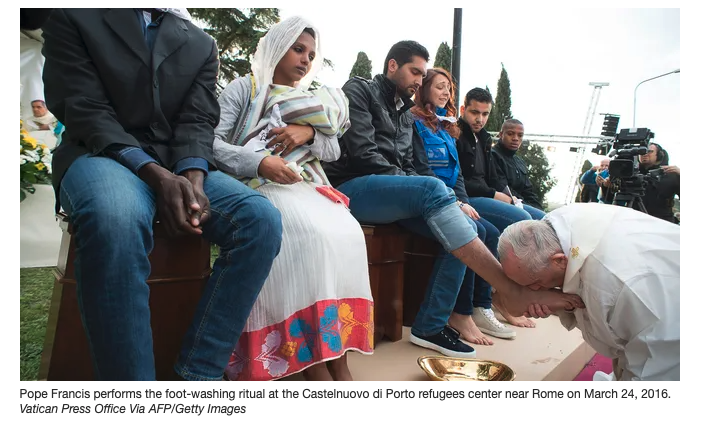This is a guest post by Dr. Kathy Lilla Cox, Research Associate in the Department of Theology and Religious Studies at the University of San Diego. Dr. Lilla Cox’s research bridges fundamental moral theology, human cognition studies, and social ethics. Topics include neuroethics, malformation in conscience formation, and the resources of monastic spiritual traditions for contemporary believers, among other exciting topics. Dr. Lilla Cox is a member of the Catholic Theological Society of America, the Society of Christian Ethics, and after the June 2021 meeting will become a Board member of the College Theology Society.
Evening Mass of the Lord’s Supper

There are two sets of readings for April 1, 2021, those for the Chrism Mass and the ones reflected upon here for the Evening Mass of the Lord’s Supper. The readings include the story of Jewish feast of Passover (Ex. 12), the words of institution for Eucharist (1 Cor.) and Jesus’ last meal with his disciples, the Last Supper (Jn 13). Collectively, they remind us that Jesus and his early followers were Jewish and practiced their faith.
Later Christian interpretation of Jesus’ last meal as the institution of the priesthood, an all-male ordained priesthood makes Holy Thursday painful for many in our church. Their gifts and callings denied leaving them feeling excluded and marginalized. Praying and reflecting on these texts using the Ignatian practice of entering the biblical scene and the Benedictine practice of lectio divina reveal for me a challenging, more inclusive, message in this time of division and global sorrow.
Holy Thursday is Jesus’ last day with his followers, the day before the agony of Good Friday and his crucifixion. The gospel of John sets this stage by placing this last supper “before the festival of Passover” and we connect this to the first reading in Exodus. While for the ancient Hebrews exiting slavery was socio-political, Christians often perceive this movement from slavery to freedom more broadly.
Today’s gospel reading from John 13 recounts how Jesus washed the disciples’ feet. My hunch is that many reading this post have done what I have done – conflated the disciples who would have been both men and women with the twelve apostles at this meal. There are many reasons for this conflation, but it happens. However, John says Jesus washes the feet of the disciples, not the apostles. The disciples would have included women. By washing the feet of his disciples, Jesus taught by example. It is easy to imagine how dirty were the feet, that walked in the ancient world, covered only by sandals. Today feet even though often clothed with socks and shoes still get dirty and smelly. And the act of someone washing your feet is an intimate act, an act of gentleness that the person receiving must accept and feel.
In Jesus’ time, a teacher washing the feet of men would have been radical enough, but for Jesus, a man and teacher, to touch a woman, to wash her feet – scandal. This revulsion at our pre-conceptions, our sense of decorum, and social rules being broken lives on. We are uncomfortable. Just like Peter was uncomfortable with the idea of someone in authority or leadership bending down on their knees with a towel and wash basin washing the feet of people, ourselves included, we deem unworthy. This is what makes Pope Francis’ Holy Thursday foot washing tradition radical and scandalous to many. He has washed the feet of prisoners, Muslims, Hindus, refugees, elderly people, people with disabilities and yes, some of them have been women.[1] Pope Francis reminds us of the type of scandal discipleship and leadership should bring about – the scandal of bringing the marginalized into the center of intimacy, of tenderness, of loving care that says I see you, you matter enough for me to wash and kiss your feet, the feet that have carried you here to me. The feet that have supported you. Revisiting the pictures of Pope Francis washing feet, I was struck this time by images where he is kissing the feet. These images pulled me into Good Friday and the ritual of kissing Jesus’ feet on the cross. In 2021, whose crucified, broken, mangled body am I willing to bend and kiss their feet in an act of accompaniment, saying I am here present, witnessing to your pain? And in so doing say, even as the structures of oppression do not change, I will not turn away.
Meanwhile the second reading
includes the eventual words of institution, words that women are told we cannot
say because we are not male like Jesus. Sitting
with the text, I was reminded of the poem, Liturgy, by Irene Zimmerman,
SSSF.[2] Sr. Zimmerman considers scriptural passages
that have Mary visiting Elizabeth after becoming pregnant, the flight into
Egypt with Joseph and the infant Jesus, searching for Jesus when he was lost,
and finally his death on the cross and resurrection on Easter. Each of Mary’s experience with Jesus, her son,
ends with the words “This is my body, my blood!” Words that women recognize as containing deep
truth, children while independent human beings are their body and blood. The poem ends with Sr. Zimmerman saying no
one would tell Mary she was not fit to say, “This is my body, my blood.” How long will we continue to tell women, they
are not fit to say those words? How long will we tell women – like those in the
Amazon that while they show up and their serve communities leading them in
prayer, like Miriam, as women serve in prisons, detention centers, interfaith
settings, ministering to the marginalized, broken, wounded people of the world
– they are not fit to serve and lead as Jesus did?
[1]The
practice of only permitting men to have their feet washed was officially
changed in January 2016 with the decree IN
MISSA IN CENA DOMINIpublished by the Congregation for Divine
Worship
and The Discipline of the Sacraments.
[2] In Womenpsalms, complied by Julia Ahlers, Rosemary Broughton, and Carol Koch (Winona, MN: St. Mary’s Press, 1992): 55-56




